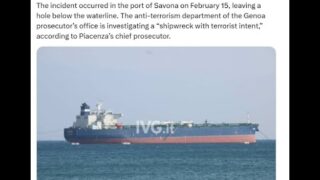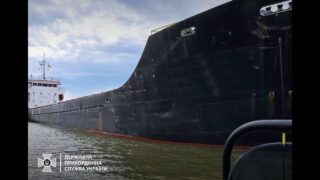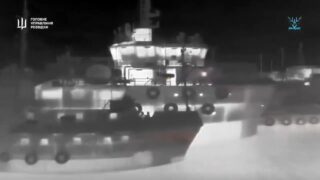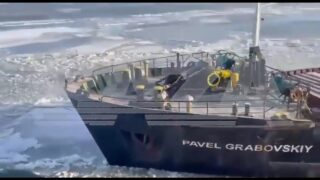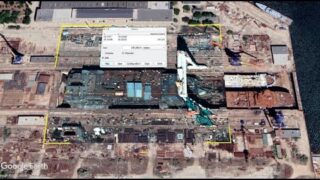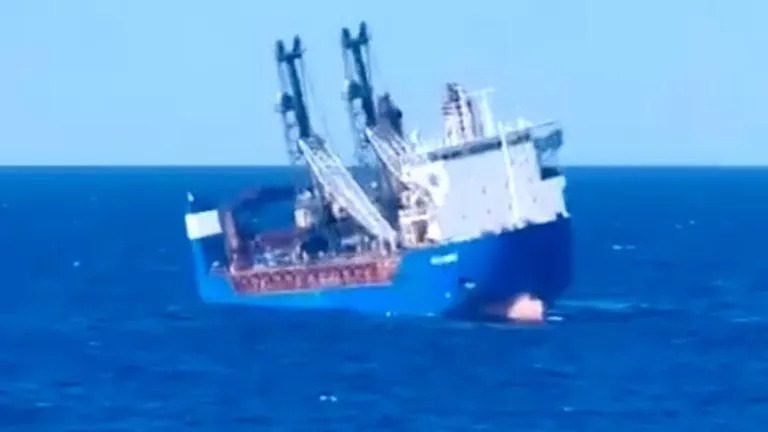
Russia claims terrorist attack sank its cargo ship in Mediterranean
On 25 December, Russian state news agency RIA Novosti reported that Oboronlogistika, a Russian Defense Ministry subsidiary, claimed its cargo vessel Ursa Major sank in the Mediterranean Sea due to a “deliberate terrorist attack.” Formerly known as Sparta Three, the ship, part of Moscow’s military logistics fleet, reportedly went down on 23 December in the international waters between Spain and Algeria.
According to crew testimony cited by Oboronlogistika, three consecutive explosions occurred on the ship’s starboard side near the stern at 13:50 Moscow time on 23 December, RIA Novosti reports. The starboard side refers to the right-hand side when facing the bow. The company said the blasts caused the vessel to list up to 25 degrees to port (the port side is a ship’s left-hand side) as it took on water.
In a separate update on Telegram, RIA Novosti reported that Oboronlogistika allegedly discovered a 50 by 50 centimeter hole with edges pointing inward, and the deck was reportedly covered with shrapnel.
The company stated through RIA Novosti that the vessel was not overloaded, describing Ursa Major as one of Russia’s largest cargo ships with a maximum capacity of 9,500 tons. The cargo reportedly included two portal cranes, two crane buckets, two ship hold covers, a 20-foot container with cover equipment, and 129 empty containers, with a total cargo weight of 806 tons.
The sinking
Previously, Spanish media outlets La Verdad and El Español reported that the explosion occurred in the engine room. A Russian military vessel reportedly led the rescue operation, which involved several ships. Spain’s Maritime Rescue Service received a distress signal when the vessel was about 57 miles off the coast of Almeria. Fourteen crew members were rescued and taken to the Spanish port of Cartagena, while two remain missing.
Russian cargo ship Ursa Major sinks off Spanish coast after explosion
RFE/RL’s Current Time says that Russian media indicated the explosion allegedly happened in the engine room as the vessel was allegedly heading east toward the Gibraltar Strait.
Mediazona noted that in Oboronlogistika’s previous press release, the company stated the vessel “departed for another voyage to the Far East with a large project cargo as part of implementing state tasks for developing port infrastructure and the Northern Sea Route.” According to the outlet, the cargo included “port cranes weighing 380 tons each, needed for expanding the terminal in Vladivostok, and 45-ton hatch covers for new icebreakers,” which was evident by the ship’s photos taken days before it sank.
Vladivostok is Russia’s Pacific port.
Why Ursa Major was in Mediterranean
Ursa Major might have really been heading to Vladivostok, having entered the Mediterranean on its way to the Suez Canal.
Previously, many OSINT analytics suggested that Ursa Major was rushing to Syria’s Tartus to take part in the evacuation of Russia’s naval base following the Assad-regime’s fall.
Naval Analytic H I Sutton noted that while the ship was officially declared to be heading to Vladivostok via the Suez Canal, “speculation from myself and others” suggested it may have been bound for eastern Libya, potentially Tobruk or Benghazi, where Russia has been reportedly planning naval infrastructure development under General Khalifa Haftar’s control.
“Its sinking definitely weakens Russia’s position further in the Mediterranean, Africa, and the Global South generally,” H I Sutton said, adding that “it also creates a sense of threat to Russian naval or military shipping globally. This means that Russia has to put resources into defending those assets globally, which is definitely good news for Ukraine.“
Russia moves air defense systems from Syria to Libya after Assad’s fall
Related:



